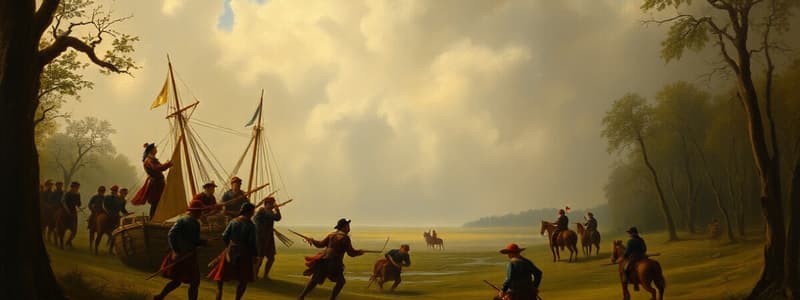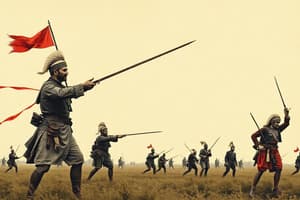Podcast
Questions and Answers
What event escalated a distant frontier skirmish into a full-scale war?
What event escalated a distant frontier skirmish into a full-scale war?
- The British invasion of Canada
- The signing of the Family Compact
- The British Cabinet making plans public (correct)
- The defeat of General Braddock
General Edward Braddock successfully captured Fort Duquesne.
General Edward Braddock successfully captured Fort Duquesne.
False (B)
What was the outcome of the Treaty of Paris (1763) for Great Britain?
What was the outcome of the Treaty of Paris (1763) for Great Britain?
Great Britain secured significant territorial gains in North America.
The British government declared war on __________ on January 4, 1762.
The British government declared war on __________ on January 4, 1762.
Match the following leaders with their roles during the war:
Match the following leaders with their roles during the war:
What strategic advantage did the British have despite facing a formidable alliance?
What strategic advantage did the British have despite facing a formidable alliance?
What was the primary cause of the French and Indian War?
What was the primary cause of the French and Indian War?
The British attempts to limit western expansion were well received by the American colonists.
The British attempts to limit western expansion were well received by the American colonists.
The French and Indian War ended with the Treaty of Paris in 1754.
The French and Indian War ended with the Treaty of Paris in 1754.
Who led the British colonial forces during the early stages of the French and Indian War?
Who led the British colonial forces during the early stages of the French and Indian War?
The French and Indian War is part of a larger conflict known as the _____ War.
The French and Indian War is part of a larger conflict known as the _____ War.
Match the following groups with their alliances in the French and Indian War:
Match the following groups with their alliances in the French and Indian War:
What was one major consequence of the French and Indian War for Great Britain?
What was one major consequence of the French and Indian War for Great Britain?
The Iroquois Confederacy aligned with the French during the war.
The Iroquois Confederacy aligned with the French during the war.
What was the year when the Treaty of Paris was signed, ending the French and Indian War?
What was the year when the Treaty of Paris was signed, ending the French and Indian War?
Flashcards are hidden until you start studying
Study Notes
French and Indian War/Seven Years’ War
- The French and Indian War was the North American theatre of the larger Seven Years’ War between Great Britain and France.
- The war began in 1754 and ended in 1763 with the Treaty of Paris.
- The French and Indian War resulted in British territorial gains in North America.
- Disagreements over frontier policy and war expenses led to colonial unrest, ultimately contributing to the American Revolution.
Tensions Leading to War
- The French and Indian War stemmed from ongoing frontier disputes in North America.
- Both French and British officials and colonists sought to expand their influence in frontier regions.
- By 1753, Britain controlled the 13 colonies to the Appalachian Mountains.
- New France, a large but sparsely settled colony, extended from Louisiana through the Mississippi Valley and Great Lakes to Canada.
- The border between French and British possessions was undefined.
- A primary point of contention became the upper Ohio River valley.
The French and Indian War in North America
- The war pitted France, French colonists, and Native allies against Great Britain, Anglo-American colonists, and the Iroquois Confederacy.
- The Iroquois controlled most of upstate New York and parts of northern Pennsylvania.
- The French built forts in the Ohio River valley to solidify their claim on the territory.
- British colonial forces, led by Lieutenant Colonel George Washington, attempted to expel the French in 1754 but were defeated.
Escalation of the War
- News of Washington's defeat reached British Prime Minister Thomas Pelham-Holles, Duke of Newcastle.
- Newcastle called for a quick retaliatory strike.
- His political opponents leaked the plans, alerting the French Government and accelerating the conflict into a full-scale war.
- The war initially did not favor the British.
- British General Edward Braddock, commander in chief of British North American forces, alienated potential Indian allies and colonial leaders.
- Braddock died in an ambush during a failed expedition to capture Fort Duquesne in present-day Pittsburgh.
A Turning Point in the War
- The war in North America entered a stalemate.
- In Europe, the French achieved a naval victory and captured Minorca, a British possession.
- The war tide shifted in favor of Great Britain after 1757.
- British forces defeated the French in India.
- In 1759, British armies conquered Canada.
The Family Compact and Spanish Involvement
- Facing defeat in North America and Europe, the French sought peace negotiations.
- British Minister William Pitt demanded not only the cession of Canada by France but also commercial concessions, which were rejected.
- Spanish King Charles III, cousin of French King Louis XV, allied with France.
- This alliance, known as the Family Compact, stipulated that Spain would declare war on Great Britain if peace was not established by May 1, 1762.
- The Family Compact revitalized French will to continue the war and prompted Britain to declare war on Spain.
British Victory and the Treaty of Paris
- British naval strength and Spanish shortcomings led to British success.
- British forces captured French Caribbean islands, Spanish Cuba, and the Philippines.
- A failed Spanish invasion of Portugal, a British ally, ended the fighting in Europe.
- In 1763, France and Spain sought peace.
- The Treaty of Paris, signed in 1763, granted Great Britain significant territorial gains in North America, including all French territory east of the Mississippi River and Spanish Florida.
- Cuba was returned to Spain.
Consequences of British Victory
- British victories led to a period of resentment in the American colonies due to war expenses.
- The British government attempted to impose taxes on colonists to cover the costs of the war.
- Colonial anger grew regarding British attempts to expand imperial authority in the colonies.
- British actions, including limiting western expansion for colonists and inadvertently provoking an Indian war, further increased tension.
- These problems ultimately spurred colonial rebellion, eventually culminating in the war for independence.
Studying That Suits You
Use AI to generate personalized quizzes and flashcards to suit your learning preferences.




